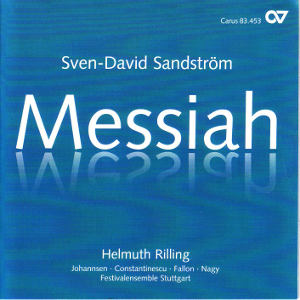 |
 |
|


alternatively
CD: Crotchet
Download: Classicsonline
|
Sven-David SANDSTRÖM
(b. 1942)
Messiah (2009)
 Robin Johannsen (soprano), Roxana Constantinescu (alto), Timothy
Fallon (tenor), Michael Nagy (baritone), Festivalensemble Stuttgart/Helmuth
Rilling
Robin Johannsen (soprano), Roxana Constantinescu (alto), Timothy
Fallon (tenor), Michael Nagy (baritone), Festivalensemble Stuttgart/Helmuth
Rilling
rec. live, Liederhalle Stuttgart, Beethovensaal, 6-7 September 2009
Sung texts and German translations enclosed
 CARUS 83.453 [36:06 + 54:15]
CARUS 83.453 [36:06 + 54:15] 
|
|
|
A little over two months ago I heard the Scandinavian premiere
of Sven-David Sandström’s Messiah in Gävle.
The artists were: Stefan Parkman conducting choral forces from
Uppsala, Gävle Symphony Orchestra and soloists including
Timothy Fallon, as on this recording, in the tenor part. That
concert was repeated in Uppsala two days later, which means
that the provinces for once were ahead of the Capital. In Stockholm
the first performance came a week later at the Berwald Hall,
conducted by Herbert Blomstedt.
I was deeply moved by that performance (see review)
and hoped that there would sooner or later appear a recording.
I had my request granted sooner than I could have dreamt. The
work was commissioned by the Bach festivals in Oregon and Stuttgart;
the Oregon premiere was in July last year (2009); Stuttgart
heard it two months later and this recording was made on that
occasion.
Sandström set the same text as Handel did, which invites
comparisons. It should be stressed, however, that Sandström’s
aim was not to imitate Handel. His tonal language is
distinctly his own and though the words are exactly those Jennens
delivered to Handel Sandström finds other solutions to
how to set them. What is an aria in Handel’s work may
be a chorus in Sandström’s, for instance. Sandström’s
arias, are not da capo which means that Sandström’s
work is shorter.
I was, naturally enough, very curious to see how I reacted to
the music at this second encounter. Let me say at once that
I was just as overwhelmed. The magnificent opening chorus Comfort
ye, by far the longest number in this Messiah, at
once had me caught and the music never lost its grip until Worthy
is the Lamb and the concluding Amen had faded away.
As in Handel’s work it’s the choruses that carry
the heaviest burden and Sandström knows exactly how to
get the most out of the choral parts, himself having sung in
choirs for many years. The orchestral writing is also extremely
varied and colourful and there are numerous instrumental solos,
not least from the woodwind. The rhythmic vitality is striking
and the big percussion section has a field day.
Once again I marvelled at the chorus For unto us a child,
the beautiful soprano-alto duet He shall feed his flock
and the Ramirez-like chorus This yoke is easy, a hit
if there is any justice in this world. Even more the a cappella
chorus Lift up your hand is among the most breathlessly
beautiful choral pieces ever. And what about the Hallelujah
chorus? Beginning hesitantly, as though the people are not quite
sure that Lord God Omnipotent really reigneth. But gradually
the truth dawns upon them, the music expands and becomes swinging
and gospel-like. Joy permeates the crowd and the final bars
are truly ecstatic.
The performance in Gävle was impressive, with overwhelming
orchestral and choral contributions. But the work’s dedicatee
Helmut Rilling and his Stuttgart forces had already performed
the Messiah at the world premiere in Oregon’s Hult
Center and were even more inside the music during the two performances
in Stuttgart and I can’t find anything that disappoints.
The technical demands on the soloists are high; they have to
execute quite a lot of coloratura, which they do with aplomb.
The two female soloists in particular are very good and Robin
Johannsen’s Behold, a virgin shall conceive is
masterly. In Gävle I thought that Timothy Fallon’s
light tenor voice didn’t carry properly but there are
no such problems here. Michael Nagy is expressive in his powerful
declamations but his wide vibrato is sometimes too prominent
for total enjoyment.
The recording is spacious and atmospheric and could just as
well have been a studio production, bar the applause at the
end, which could surely have been edited out. Sandström
started out as downright avant-garde composer, but he has, step
by step, become more approachable - without losing his personal
tonal language. This new Messiah is deeply communicative
in an idiom that is modern but with a melodic and rhythmic beauty
that should please even listeners who normally fight shy of
contemporary music. In my mind this is one of the finest large-scale
choral works during the whole post-war era.
Göran Forsling
|
|




















